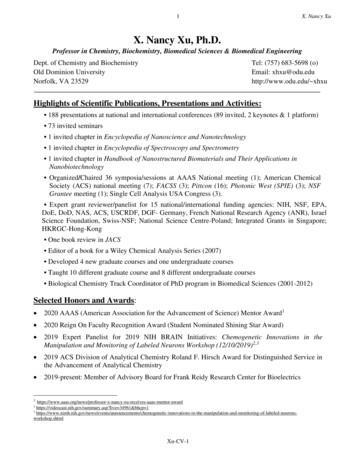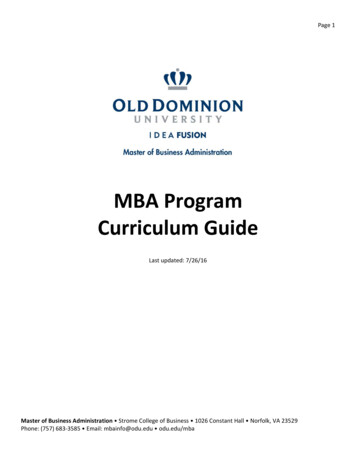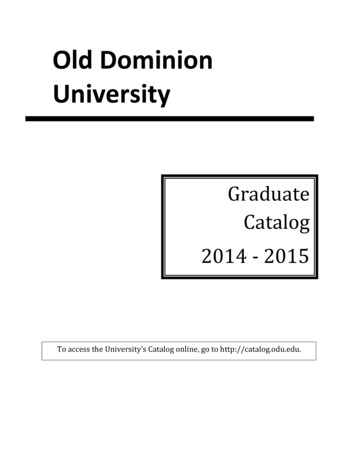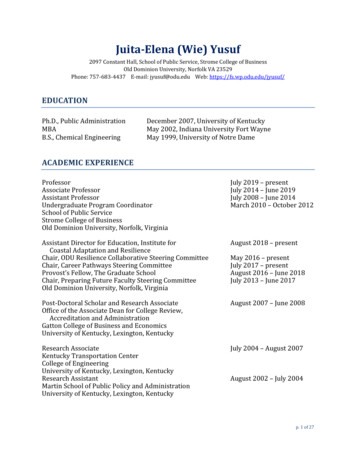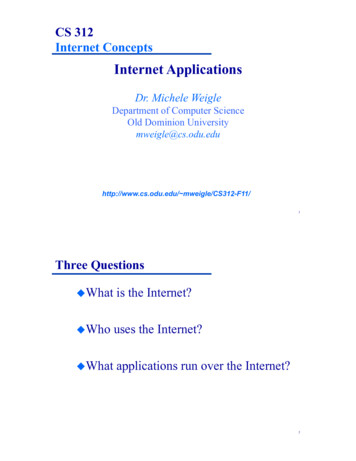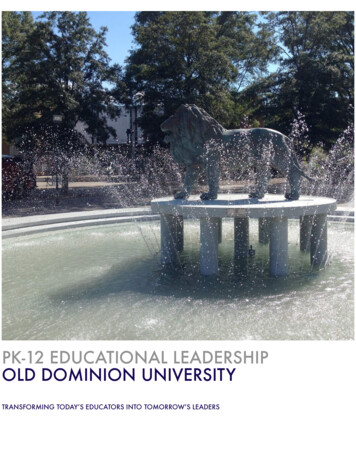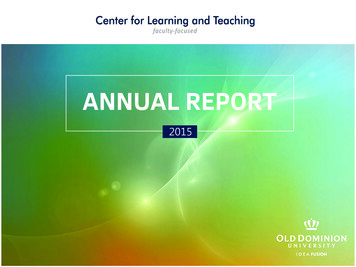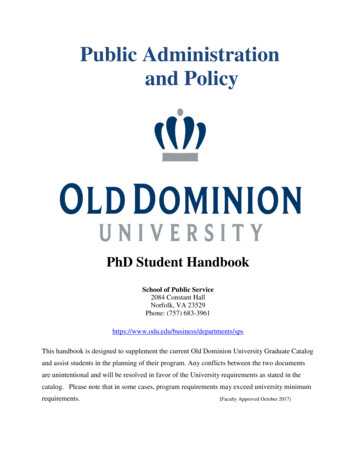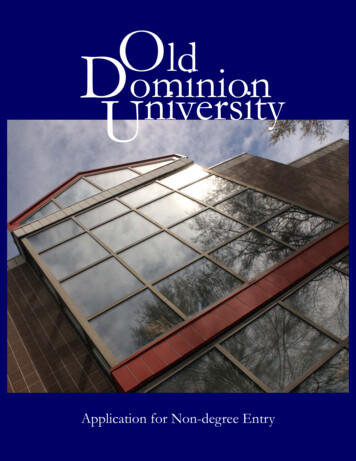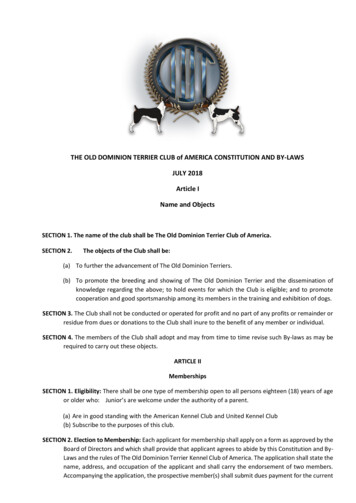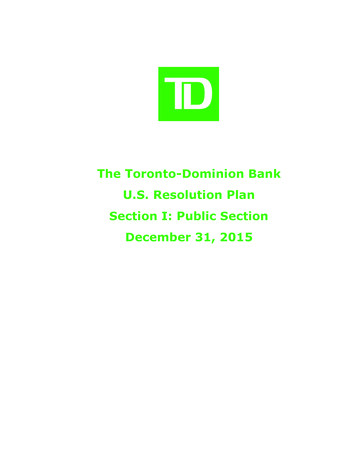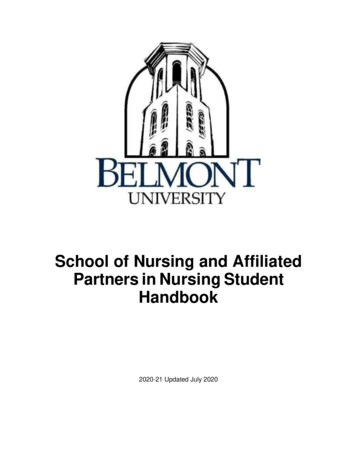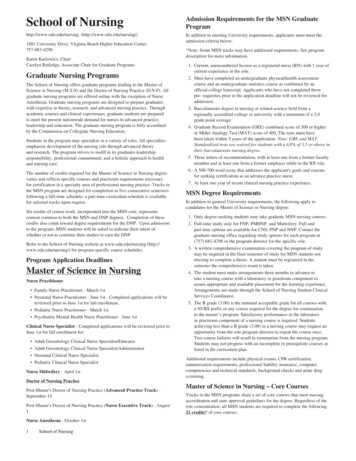
Transcription
School of NursingAdmission Requirements for the MSN GraduateProgramhttp://www.odu.edu/nursing (http://www.odu.edu/nursing/)In addition to meeting University requirements, applicants must meet theadmission criteria below.1881 University Drive, Virginia Beach Higher Education Center757-683-4298Karen Karlowicz, ChairCarolyn Rutledge, Associate Chair for Graduate ProgramsGraduate Nursing ProgramsThe School of Nursing offers graduate programs leading to the Master ofScience in Nursing (M.S.N) and the Doctor of Nursing Practice (D.N.P). Allgraduate nursing programs are offered online with the exception of NurseAnesthesia. Graduate nursing programs are designed to prepare graduateswith expertise in theory, research, and advanced nursing practice. Throughacademic courses and clinical experiences, graduate students are preparedto meet the present nationwide demand for nurses in advanced practice,leadership and education. The graduate nursing program is fully accreditedby the Commission on Collegiate Nursing Education.Students in the program may specialize in a variety of roles. All specialtiesemphasize development of the nursing role through advanced theoryand research. The program strives to instill in its graduates leadershipresponsibility, professional commitment, and a holistic approach to healthand nursing care.The number of credits required for the Master of Science in Nursing degreevaries and reflects specific courses and practicum requirements necessaryfor certification in a specialty area of professional nursing practice. Tracks inthe MSN program are designed for completion in five consecutive semestersfollowing a full-time schedule; a part-time curriculum schedule is availablefor selected tracks upon request.Six credits of course work, incorporated into the MSN core, representscontent common to both the MSN and DNP degrees. Completion of thesecredits also count toward degree requirements for the DNP. Upon admissionto the program, MSN students will be asked to indicate their intent ofwhether or not to continue their studies to earn the DNP.Refer to the School of Nursing website at www.odu.edu/nursing (http://www.odu.edu/nursing/) for program specific course schedules.Program Application DeadlinesMaster of Science in NursingNurse Practitioner Family Nurse Practitioner - March 1st Neonatal Nurse Practitioner - June 1st - Completed applications will bereviewed prior to June 1st for fall enrollment. Pediatric Nurse Practitioner - March 1st Psychiatric Mental Health Nurse Practitioner - June 1stClinical Nurse Specialist - Completed applications will be reviewed prior toJune 1st for fall enrollment for: Adult Gerontology Clinical Nurse Specialist/EducatorAdult Gerontology Clinical Nurse Specialist/AdministratorNeonatal Clinical Nurse SpecialistPediatric Clinical Nurse SpecialistNurse Midwifery - April 1st*Note: Some MSN tracks may have additional requirements. See programdescription for more information.1. Current, unencumbered license as a registered nurse (RN) with 1 year ofcurrent experience in the role.2. Must have completed an undergraduate physical/health assessmentcourse and an undergraduate statistics course as confirmed by anofficial college transcript. Applicants who have not completed thesepre- requisites prior to the application deadline will not be reviewed foradmission.3. Baccalaureate degree in nursing or related science field from aregionally accredited college or university with a minimum of a 3.0grade point average.4. Graduate Record Examination (GRE) combined score of 300 or higheror Miller Analogy Test (MAT) score of 400. The tests must havebeen taken within 5 years of the application. Note: GRE and MATStandardized tests are waived for students with a GPA of 3.5 or above intheir baccalaureate nursing degree.5. Three letters of recommendation, with at least one from a former facultymember and at least one from a former employer while in the RN role.6. A 500-700 word essay that addresses the applicant's goals and reasonsfor seeking certification as an advance practice nurse.7. At least one year of recent clinical nursing practice experience.MSN Degree RequirementsIn addition to general University requirements, the following apply tocandidates for the Master of Science in Nursing degree:1. Only degree-seeking students may take graduate MSN nursing courses.2. Full-time study only for FNP, PMHNP and Midwifery. Full andpart time options are available for CNS, PNP and NNP. Contact thegraduate nursing office regarding study options for each program at(757) 683-4298 or the program director for the specific role.3. A written comprehensive examination covering the program of studymay be required in the final semester of study for MSN students notelecting to complete a thesis. A student must be registered in thesemester the comprehensive exam is taken.4. The student must make arrangements three months in advance totake a nursing course with a laboratory or practicum component toassure appropriate and available placement for the learning experience.Arrangements are made through the School of Nursing Student ClinicalServices Coordinator.5. The B grade (3.00) is the minimal acceptable grade for all courses witha NURS prefix or any course required for the degree for continuationin the master’s program. Satisfactory performance in the laboratoryor practicum component of a nursing course is required. Studentsachieving less than a B grade (3.00) in a nursing course may request anopportunity from the role program director to repeat the course once.Two course failures will result in termination from the nursing program.Students may not progress with an incomplete in prerequisite courses aslisted in the curriculum plan.Additional requirements include physical exams, CPR certification,immunization requirements, professional liability insurance, computercompetencies and technical standards, background checks and urine drugscreening.Doctor of Nursing PracticePost-Master's Doctor of Nursing Practice (Advanced Practice Track) September 15Post-Master's Doctor of Nursing Practice (Nurse Executive Track) - August1Nurse Anesthesia - October 1st1School of NursingMaster of Science in Nursing – Core CoursesTracks in the MSN programs share a set of core courses that meet nursingaccreditation and state approval guidelines for the degree. Regardless of therole concentration, all MSN students are required to complete the following21 credits* of core courses.
NURS 709NURS 715NURS 761NURS 770NURS 771NURS 800NURS 802Evidence-Based Research and Theories forNursing PracticeEthical Concepts of Advanced PracticeNursingPharmacology for Advanced PracticeNursingPathophysiology for Advanced NursingPracticePhysical Assessment for Advanced NursingPracticeIntroduction to Healthcare Disparities,Vulnerable Populations, and Epidemiology *The Business of Advanced Nursing Practice333*33NURS 763NURS 764NURS 7653NURS 766NURS 76721Total HoursPrimary Care Approaches for ChildrenFamily and Community Primary CareAssessmentAging in the 21st CenturyAdvanced Family Nursing I PracticumAdvanced Family Nursing I: Management ofAcute IllnessesHealth Promotion and MaintenanceAdvanced Family Nursing II PracticumAdvanced Family Nursing II: Managementof Chronic IllnessesPrimary Care Approaches for WomenAdvanced Family Nursing III Practicum313332433349Masters of Science in Nursing - PediatricNurse Practitioner RoleThese courses count toward the DNP.Transfers Between MSN ProgramsDiana Cartagena, Program DirectorStudents may not transfer between programs in the MSN. Any studentwishing to change programs may apply to a new program for admissionduring the regularly scheduled application process and deadline for theprogram. Their applications will be considered and reviewed as a newadmission with the entire application pool.Progression to the DNPMSN students wishing to pursue a DNP must declare their intention onadmission and no later than the end of their first semester in the MSNprogram. If pursuing the DNP Advanced Practice program, NURS 805 andNURS 865 are taken in the final semester of the MSN program. Any studentwho has completed their MSN and did not declare their intent to pursue theDNP must apply and be considered with all post masters applicants as a newadmission to the DNP program.Transfer Credit Evaluation PolicyAny transfer credit requests must be submitted to the concentration programdirector within two weeks of notification of admission to the program. Oncecoursework has commenced for your program of study, all coursework mustbe completed at Old Dominion University, and no further transfer creditswill be awarded.Master of Science in Nursing – FamilyNurse Practitioner RoleDeborah Gray, Co-Program DirectorKaren Higgins, Co-Program DirectorThe family nurse practitioner (FNP) role prepares graduate studentsto provide a full range of primary care services to individuals andfamilies throughout the life span. In collaboration with other healthcare professionals, graduate students provide health promotion, healthmaintenance and restorative care to well, at-risk, and chronically ill clientsand their families. Student clinical experiences are provided in a varietyof primary care settings. Successful completion of the program qualifiesstudents to register for the AANP or ANCC examination for certification asa family nurse practitioner. The MSN - Family Nurse Practitioner is offeredonline only.Family Nurse Practitioner CurriculumIn addition to the 21 credits of MSN core courses the following courses arerequired for degree completion of the FNP/MSN for a program total of 49credits.Each semester in the program students are assessed a non-refundableprogram fee of 450 to be paid in addition to tuition. The fee covers avariety of program-related expenses outside of tuition and books.MSN Core CoursesAdditional Requirements for Family Nurse PractitionerNURS 721NURS 760NURS 7623*Total HoursNURS 705NURS 719The pediatric nurse practitioner (PNP) role prepares graduate studentsto provide a full range of services to pediatric patients in primary caresettings. In collaboration with other health care professionals, graduatestudents provide health promotion, health maintenance and restorative careto well, at-risk, and chronically ill pediatric patients and their families.Student clinical experiences are provided in a variety of primary caresettings for students pursuing the primary care pediatric role. Successfulcompletion of the program qualifies students to register for the examinationfor certification as a pediatric nurse practitioner. The MSN - Pediatric NursePractitioner is offered online only.Pediatric Nurse Practitioner CurriculumIn addition to the 21 credits of MSN core courses the following courses arerequired for degree completion of the PNP/MSN for a program total of 49credits.Each semester in the program students are assessed a non-refundableprogram fee of 450 to be paid in addition to tuition. The fee covers avariety of program-related expenses outside of tuition and books.MSN Core CoursesAdditional Requirements for Pediatric Nurse PractitionerNURS 705Primary Care Approaches for ChildrenNURS 719Family and Community Primary CareAssessmentNURS 763Health Promotion and MaintenanceNURS 781Advanced Pediatric Nursing: Practicum IPrimary CareNURS 782The Growth and Development of Children inthe 21st CenturyNURS 783Management of Acute Pediatric Conditions 1NURS 784Advanced Pediatric Nursing: Practicum IINURS 785Seminar in Pediatrics: Management ofChronic and Complex Clinical ConditionsNURS 786Management of Acute/Critical PediatricConditions IINURS 788Advanced Pediatric Nursing: Practicum III21Total Hours493123334333Master of Science in Nursing - NeonatalNurse Practitioner RoleSusan Braid, Program Director21The neonatal nurse practitioner (NNP) provides population-focused healthcare to preterm ( 37 weeks) and term neonates, infants, and children upto 2 years of age. As a key member of an interprofessional team, the NNPSchool of Nursing2
participates in a wide variety of complex patient care activities in settingsthat include, but are not limited to, all levels of neonatal inpatient care inboth academic and community-based settings; transport, acute care, andchronic care settings; delivery rooms; and outpatient settings. Studentclinical experiences are designed to prepare the graduate to practice as anNNP providing direct patient care in a newborn nursery, or in a Level II,III, or IV NICU. Successful completion of the program qualifies students toregister for the examination for certification as neonatal nurse practitioner.For admission requirements see the website for the School of Nursingat http://www.odu.edu/nursing or contact the program director. The MSN Neonatal Nurse Practitioner is offered online only.Neonatal Nurse Practitioner CurriculumIn addition to the 21 credits of MSN core courses the following courses arerequired for degree completion of the NNP/MSN for a program total of 52credits.Each semester in the program students are assessed a non-refundableprogram fee of 450 to be paid in addition to tuition. The fee covers avariety of program-related expenses outside of tuition and books.MSN Core CoursesAdditional Requirements for Neonatal Nurse PractitionerNURS 731Newborn AssessmentNURS 751Developmental Neonatal PhysiologyNURS 772Foundations of Advanced Neonatal CareNURS 773Pharmacology for Advanced Neonatal CareNURS 774Advanced Neonatal Care: High RiskManagement INURS 775Advanced Neonatal Care: High RiskManagement IINURS 776Advance Neonatal Nursing Practicum INURS 778Advanced Neonatal Nursing: Practicum IINURS 779Seminar in Pediatrics:Managment of Chronicand Complex Neonatal Clinical ProblemsNURS 789Advanced Neonatal Nursing Practicum III21Total Hours523233333434Master of Science in Nursing - AdultGerontology Clinical Nurse Specialist/Educator RolePamela Sharp, Program DirectorThe School of Nursing offers a curriculum leading to the degree of Masterof Science in Nursing with an advanced practice area of Adult GerontologyClinical Nurse Specialist/Educator. The program of study prepares studentsas expert clinicians in the application of evidence-based knowledge withinthe realms of nursing interventions, teaching and research. Students alsoreceive preparation as nurse educators, and are therefore dually prepared forclinical and academic roles.The program requires course content in theory, research, education, AdultGerontology CNS professional and clinical cores, and the advanced practicearea with a selected secondary focus. Applicants are admitted for either fulltime or part-time study and begin in the fall. The curriculum is designedto prepare nurses as Adult Gerontology Clinical Nurse Specialists witha secondary clinical focus in an area of their choice. Graduates of thisprogram are eligible to sit for the American Nurses' Association (ANCC)Adult Gerontology Clinical Nurse Specialist Certification Exam or theAmerican Association of Critical Care Nurses (AACN) Acute Care AdultGerontology (AACNS-AG) Exam. The MSN - Adult Gerontology ClinicalNurse Specialist/Educator is offered online only.In addition to the 21 credits of MSN core courses the following courses arerequired for degree completion of the CNS/Educator program for a total of49 credits.3School of NursingMSN Core CoursesAdditional Requirements for the Adult Gerontology ClinicalNurse Specialist/Educator CurriculumNURS 720Instructional Delivery Methods & LearnerAssessmentNURS 721Aging in the 21st CenturyNURS 730Nursing Curricular Design and ProgramEvaluationNURS 734Educator Internship: Classroom InstructionNURS 738Clinical Nurse Specialist I: Introduction toPracticeNURS 739Clinical Nurse Specialist I: RoleSocializationNURS 756Clinical Nurse Specialist II: Transition toPracticeNURS 757Clinical Nurse Specialist Practicum II: RoleTransitionNURS 763Health Promotion and Maintenance21Total Hours49333324352Master of Science in Nursing - AdultGerontology Clinical Nurse Specialist/Administrator RoleThe School of Nursing offers a curriculum leading to the degree ofMaster of Science in Nursing with an advanced practice area of AdultGerontology Clinical Nurse Specialist/Administrator. The program ofstudy prepares students as expert clinicians in the application of evidencebased knowledge within the realms of nursing interventions, teaching andresearch. Students also receive preparation as nurse administrators, andare therefore dually prepared for clinical and administrative or advancedleadership roles. The Nurse Administrator role prepares the graduate forleadership positions in a variety of health care settings. The administrationportion of the curriculum is designed to address the competencies defined bythe American Organization of Nurse Executives (AONE) and the Essentialsof Masters Education in Nursing (AACN, 2011). New models of leadership,management, and the role of the advanced practice nurse in assuringeffective organizations are analyzed throughout the curriculum. Graduatesof this program are eligible to sit for the American Nurses' Association(ANCC) Adult Gerontology Clinical Nurse Specialist Certification Examor the American Association of Critical Care Nurses (AACN) Acute CareAdult-Gerontology (ACCNS-AG) Exam. The MSN - Adult GerontologyClinical Nurse Specialist/Administrator is offered online only.Adult Gerontology Clinical Nurse Specialist/Administrator CurriculumIn addition to the 21 credits of MSN core courses the following courses arerequired for degree completion of the CNS/Administrator program for a totalof 46-49 credits.MSN Core CoursesAdditional Requirements for the Adult Gerontology ClinicalNurse Specialist/Administrator CurriculumNURS 721Aging in the 21st CenturyNURS 735Organizational and Management TheoryNURS 738Clinical Nurse Specialist I: Introduction toPracticeNURS 739Clinical Nurse Specialist I: RoleSocializationNURS 740Strategic LeadershipNURS 756Clinical Nurse Specialist II: Transition toPracticeNURS 757Clinical Nurse Specialist Practicum II: RoleTransitionNURS 763Health Promotion and Maintenance2132242352
NURS 780Financial Issues in Nursing AdministrationTotal Hours347Master of Science in Nursing - PediatricClinical Nurse Specialist RoleThe School of Nursing offers a curriculum leading to the degree of Masterof Science in Nursing with an advanced practice area of Pediatric ClinicalNurse Specialist. The program of study prepares students as expertclinicians in the application of evidence-based knowledge within the realmsof nursing interventions, teaching and research.The program requires course content in theory, research, education, PediatricCNS professional and clinical cores, and the advanced practice area with aselected secondary focus. The curriculum is designed to prepare nurses asPediatric Clinical Nurse Specialists. Graduates of this program are eligibleto sit for the American Association of Critical Care Nurses (AACN) AcuteCare Pediatric (ACCNS-P) Exam. The MSN - Pediatric Clinical NurseSpecialist is offered online only.Pediatric Clinical Nurse Specialist CurriculumIn addition to the 21 credits of MSN core courses the following courses arerequired for degree completion of the CNS/Pediatric program for a total of50 credits.MSN Core CoursesAdditional Requirements for the Pediatric Clinical NurseSpecialistNURS 705Primary Care Approaches for ChildrenNURS 719Family and Community Primary CareAssessmentNURS 738Clinical Nurse Specialist I: Introduction toPracticeNURS 739Clinical Nurse Specialist I: RoleSocializationNURS 756Clinical Nurse Specialist II: Transition toPracticeNURS 757Clinical Nurse Specialist Practicum II: RoleTransitionNURS 763Health Promotion and MaintenanceNURS 782The Growth and Development of Children inthe 21st CenturyNURS 783Management of Acute Pediatric Conditions 1NURS 786Management of Acute/Critical PediatricConditions II21Total Hours50In addition to the 21 credits of MSN core courses the following courses arerequired for degree completion of the CNS/Neonatal
Family Nurse Practitioner Curriculum In addition to the 21 credits of MSN core courses the following courses are required for degree completion of the FNP/MSN for a program total of 49 credits. Each semester in the program students are assessed a non-refundable program fee of
